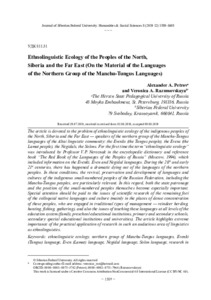Ethnolinguistic Ecology of the Peoples of the North, Siberia and the Far East (On the Material of the Languages of the Northern Group of the Manchu-Tungus Languages)
Скачать файл:
URI (для ссылок/цитирований):
https://elib.sfu-kras.ru/handle/2311/112628Автор:
Petrov, Alexander A.
Razumovskaya, Veronica A.
Петров, А. А.
Разумовская, В. А.
Дата:
2019-08Журнал:
Журнал Сибирского федерального университета. Гуманитарные науки. Journal of Siberian Federal University. Humanities & Social Sciences;2019 12 (8)Аннотация:
The article is devoted to the problem of ethnolinguistic ecology of the indigenous peoples of
the North, Siberia and the Far East — speakers of the northern group of the Manchu-Tungus
languages of the Altai linguistic community: the Evenks (the Tungus people), the Evens (the
Lamut people), the Negidals, the Solons. For the first time the term “ethnolinguistic ecology”
was introduced by Professor V. P. Neroznak in the encyclopedic dictionary and reference
book “The Red Book of the Languages of the Peoples of Russia” (Moscow, 1994), which
included information on the Evenki, Even and Negidal languages. During the 20th and early
21st centuries, there has happened a dramatic dying out of the languages of the northern
peoples. In these conditions, the revival, preservation and development of languages and
cultures of the indigenous small-numbered
peoples of the Russian Federation, including the
Manchu-Tungus
peoples, are particularly relevant. In this regard, both the state patronage
and the position of the small-numbered
peoples themselves become especially important.
Special attention should be paid to the issues of scientific research of the remaining foci
of the colloquial native languages and culture (mainly in the places of dense concentration
of these peoples, who are engaged in traditional types of management — reindeer herding,
hunting, fishing, gathering), and also the issues of teaching these languages at all levels of the
education system (family, preschool educational institutions, primary and secondary schools,
secondary special educational institutions and universities). The article highlights extreme
importance of the practical application of research in such an audacious area of linguistics
as ethnolinguistics Исследуется проблема этнолингвоэкологии коренных малочисленных народов Севера,
Сибири и Дальнего Востока — носителей языков северной группы тунгусо-маньчжурских
языков алтайской языковой общности: эвенков (тунгусов), эвенов (ламутов), негидальцев, солонов. Впервые термин “этнолингвоэкология” был введен в научный оборот профессором В. П. Нерознаком в энциклопедическом словаре-справочнике
“Красная книга
языков народов России” (М., 1994), в котором были помещены сведения по эвенкийскому, эвенскому и негидальскому языкам. В течение XX — начала XXI века происходит активный процесс утраты языков северных народов. В этих условиях представляется особенно актуальным возрождение, сохранение и развитие языков и культур
коренных малочисленных народов РФ, в том числе и тунгусо-маньчжурских.
В этом
случае важное значение приобретает как патронат со стороны государства, так
и позиция самих малочисленных народов. Особое внимание следует уделять вопросам
научного исследования сохранившихся очагов бытования разговорного родного языка
и культуры (приоритетно в местах компактного проживания этих народов и ведения
традиционных видов хозяйствования — оленеводства, охоты, рыболовства, собирательства), а также преподавания этих языков на всех уровнях системы образования
и воспитания (семья, дошкольные образовательные учреждения, начальная и средняя
школа, средние специальные учебные заведения и вузы). Констатируется чрезвычайная важность практического применения результатов исследований такого интересного направления языкознания, как этнолингвистика
Коллекции:
Метаданные:
Показать полную информациюСвязанные материалы
Показаны похожие ресурсы по названию, автору или тематике.
-
Ethnolinguistic Ecology of the Peoples of the North, Siberia and the Far East (On the Material of the Languages of the Northern Group of the Manchu-Tungus Languages)
Petrov, A. A.; Razumovskaya, V. A. (2019-08)The article is devoted to the problem of ethnolinguistic ecology of the indigenous peoples of the North, Siberia and the Far East — speakers of the northern group of the Manchu-Tungus languages of the Altai linguistic ... -
The Even Language: Studying, Teaching and Linguistic Ecology Challenges
Petrov, Alexander A.; Razumovskaya, Veronica A.; Петров, А. А.; Разумовская, В. А. (Сибирский федеральный университет. Siberian Federal University, 2021-06)The article is devoted to the history of the study and teaching of the Even (Lamut) language in Russia in the period from the 17th – to the beginning of the 21st century. Special attention is paid to the problem of linguistic ... -
The Problem of the Sakha People’s Ethnogenesis: a New Approach
Ushnitskiy, Vasiliy V.; Ушницкий, В.В. (Сибирский федеральный университет. Siberian Federal University., 2016-08)The subject of the research is the problem of ethnogenesis and early ethnic history of the Sakha people. The issue of the research is interaction of the Sakha people’s ancestors with Turko-Mongol ethnic groups of the Baikal ... -
Ethnolinguistic Aspects of Cultural Affiliation
Zhanalina, Indira M.; Begalieva, Saule B.; Erkebekova, Elmira K.; Kozhamkulova, Gulmira Y.; Жаналина, И. М.; Бегалиева, С. Б.; Еркебекова, Э. К.; Кожамкулова, Г. Е. (Journal of Siberian Federal University. Сибирский федеральный университет, 2024-04)This article explores the complex dynamics of ethnolinguistic aspects of cultural belonging, seeking to shed light on the deep relationship between language and identity in various communities. Focusing on literature, ... -
Русский язык в интернете: анализ молодежного сленга с оценочным значением
Абайдельданова, М. К.; Р. Гусман Тирадо; Abaideldanova, Meruyert K.; Rafael Guzmán Tirado (Journal of Siberian Federal University. Сибирский федеральный университет, 2024-01)Статья посвящена проблеме определения статуса молодежного сленга и его влияния на языковую культуру студентов. Основным источником функционирования и распространения молодежного сленга является глобальная сеть Интернет. ...

